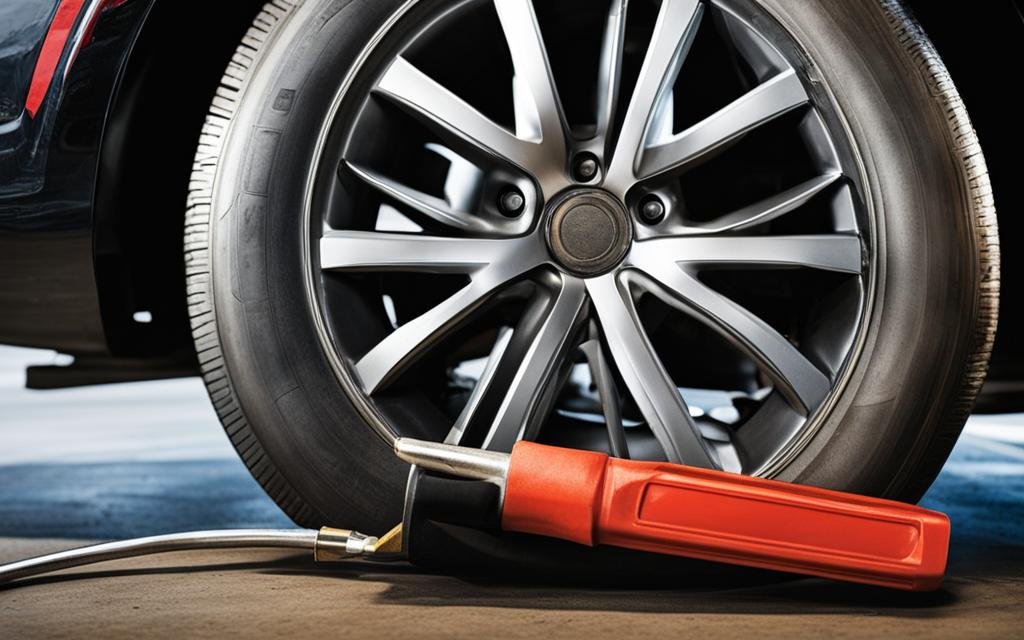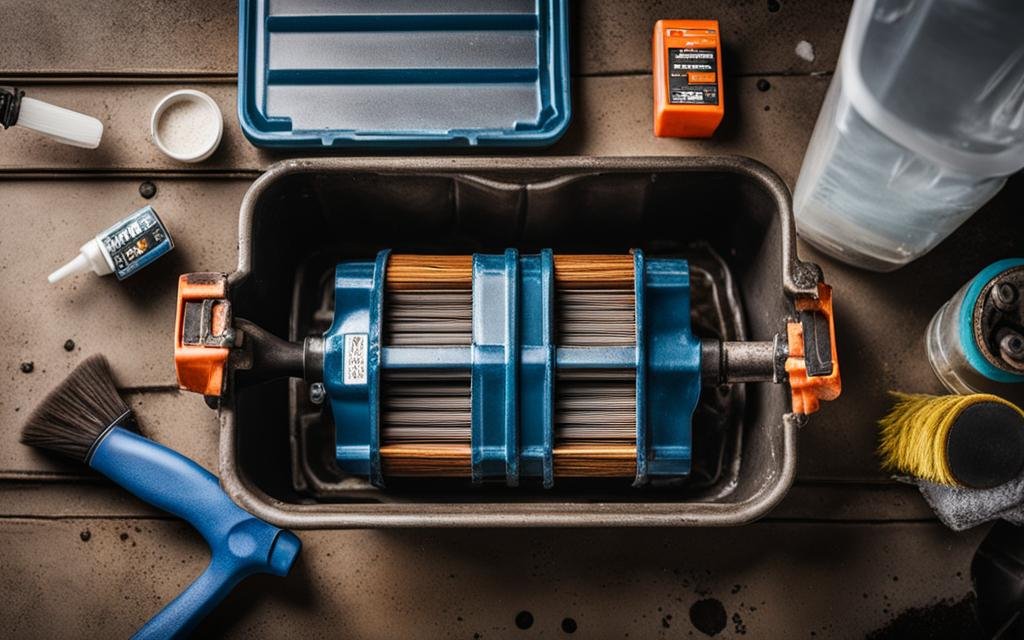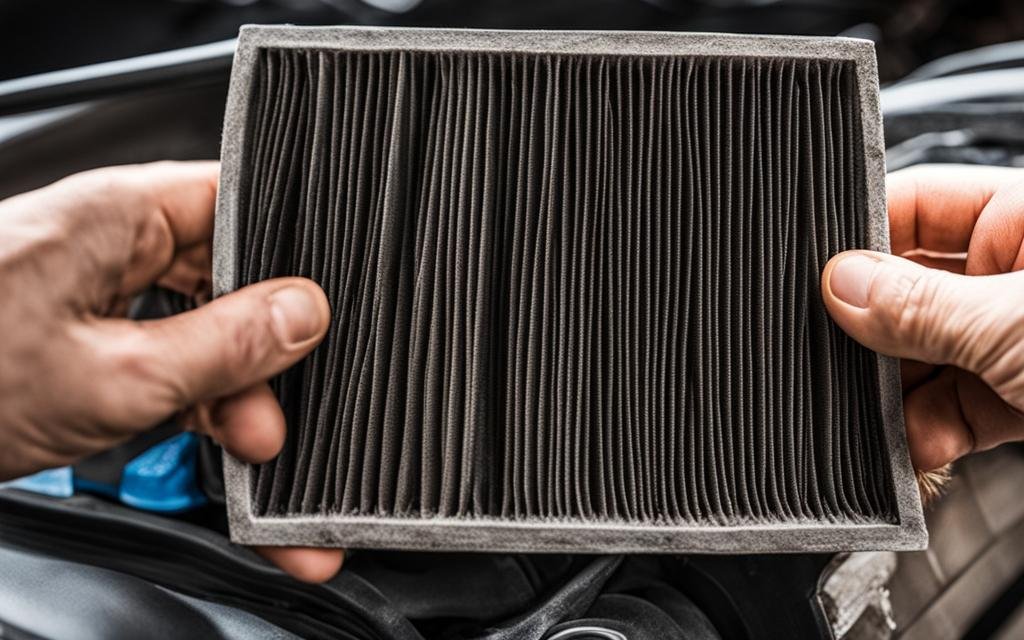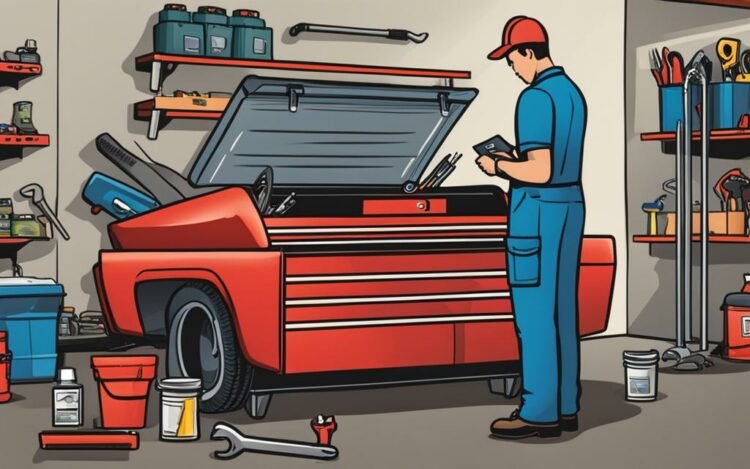Keeping up with car maintenance is essential for both your safety and your savings. By following these 13 car maintenance tips, you can keep your car out of the shop and extend its lifespan. From checking your spare tire to regularly changing the oil, these tips will help you save money on repairs and accessories.
Key Takeaways:
- Regularly check your spare tire to avoid the costly expense of calling a tow truck.
- Change your oil every 5,000 miles or as per your car manufacturer’s recommendations to lower the risk of engine damage.
- Keep your car battery terminals clean to prevent potential battery failure and replacements.
- Replace your brake pads on time to ensure proper working condition and avoid accidents.
- Maintain your cabin air filter every 12 months or 12,000 miles to prevent AC system issues.
By following these car maintenance tips, you can save money on repairs and accessories while ensuring the longevity and safety of your vehicle. From regular tire rotations to checking your coolant, each maintenance task plays a role in preventing costly repairs in the future. Smart shopping for car maintenance is all about being proactive and staying on top of routine maintenance tasks to avoid major issues down the road.
Check Your Spare Tire Regularly
One important aspect of car maintenance that often gets overlooked is checking the condition of your spare tire. It’s easy to forget about it until you need it, but by then it might be too late. That’s why it’s crucial to regularly check your spare tire to ensure it’s in good condition and ready to use in case of an emergency.
Start by inspecting the tire for any signs of damage or excessive wear. Look for cracks, bulges, or punctures that could compromise its performance. Additionally, check the air pressure of the spare tire. Low air pressure can affect its ability to support the weight of your vehicle.
To check the air pressure, you’ll need a tire pressure gauge. Remove the spare tire from its storage location and locate the valve stem. Remove the valve cap and firmly press the tire pressure gauge onto the valve stem. The gauge will display the air pressure of the tire. Compare the reading to the recommended pressure specified in your vehicle’s manual. If the pressure is too low, use an air compressor to inflate the tire to the correct level.

Regularly checking your spare tire ensures that it’s ready to go when you need it most. By investing a few minutes of your time each month, you can save yourself the hassle and expense of calling a tow truck in the event of a flat tire. Don’t let a neglected spare tire leave you stranded on the side of the road. Stay proactive and keep your spare tire in good condition.
Expert Tip: If you’re in the market for Duramax engine accessories and want to ensure you’re getting the best deal possible, look no further than The Diesel Dudes coupon code, where you can score significant savings on top-of-the-line parts designed to take your vehicle to the next level without breaking the bank.
Change Your Oil Regularly
One of the most important maintenance tasks for your car is regular oil changes. Oil plays a crucial role in lubricating the engine and keeping it running smoothly. Over time, oil can become dirty and lose its effectiveness, causing potential damage to the engine. By changing the oil regularly, you can prevent engine problems and extend the lifespan of your vehicle.
The frequency of oil changes depends on various factors, including your driving habits, the type of oil used, and the manufacturer’s recommendations. As a general guideline, it’s recommended to change the oil every 5,000 miles or as advised in your car’s owner’s manual. This ensures that the engine is always supplied with clean and fresh oil, reducing the risk of sludge buildup and engine damage.
Regular oil changes also contribute to better fuel efficiency. Fresh oil helps reduce friction within the engine, allowing it to run more efficiently and consume less fuel. This not only saves you money at the gas pump but also reduces your carbon footprint. So, don’t overlook the importance of regular oil changes in maintaining your car’s performance and fuel economy.
Keep Your Battery Clean
Maintaining your car’s battery is an important aspect of car maintenance that often gets overlooked. A clean battery not only helps ensure optimal performance but also extends its lifespan. To keep your battery in good condition, regularly clean the battery terminals to prevent corrosion. Corrosion on the terminals can hinder the battery’s ability to charge and ultimately lead to battery failure.

How to Clean Battery Terminals:
- Start by disconnecting the negative (black) battery cable, followed by the positive (red) cable.
- Use a wire brush to gently scrub away any corrosion on the battery terminals. Make sure to remove any dirt or grime buildup as well.
- After cleaning, rinse the terminals with a mixture of baking soda and water to neutralize any remaining acid residue.
- Dry the terminals thoroughly and apply a thin layer of petroleum jelly or battery terminal protector to prevent future corrosion.
- Reconnect the positive cable first, followed by the negative cable, and ensure they are securely attached.
By regularly cleaning your battery terminals, you can prevent corrosion and maintain a healthy battery. This simple maintenance task not only helps save you money by avoiding the cost of a battery replacement but also ensures that your car starts reliably every time you turn the key.
Replace Your Brake Pads on Time
Proper maintenance of your brake system is essential for your safety on the road and to avoid costly accidents. One important aspect of brake system maintenance is replacing your brake pads on time. Brake pads wear down over time, and if they become too thin, they can compromise your ability to stop effectively.
To ensure that your brakes are in good condition, watch out for warning signs such as squeaking or grinding noises when you apply the brakes. These are indications that your brake pads may need to be replaced. It’s crucial not to ignore these signs and schedule a brake pad replacement as soon as possible.
By replacing your brake pads on time, you not only ensure your safety but also prevent further damage to your braking system. Delaying this maintenance task can lead to more significant and costly repairs down the line, such as damage to the brake rotors or calipers. Don’t take chances when it comes to your brake system. Keep a regular maintenance schedule and consult a professional if you’re unsure about the condition of your brake pads.
Maintain Your Cabin Air Filter
When it comes to maintaining your car’s air conditioning system and ensuring good air quality inside, one important task is to regularly replace your cabin air filter. The cabin air filter plays a crucial role in filtering out dust, pollen, and other airborne particles, providing you with clean and fresh air.
To keep your air conditioning system functioning optimally and to prevent potential AC system issues, it is recommended to replace your cabin air filter every 12 months or 12,000 miles, whichever comes first. This simple maintenance task is cost-effective and can save you from expensive repairs in the long run. By regularly replacing the cabin air filter, you can ensure that your AC system works efficiently and enjoy a comfortable and healthy driving experience.

Benefits of Regular Cabin Air Filter Replacement
- Improved Air Quality: A clean cabin air filter ensures that the air inside your car is free from pollutants, allergens, and unpleasant odors. It helps you breathe easier and promotes a healthier environment inside your vehicle.
- Enhanced AC System Performance: A clogged or dirty cabin air filter can restrict airflow to your air conditioning system, making it work harder to cool or heat the cabin. By replacing the filter regularly, you allow the AC system to function efficiently, reducing strain on its components and potentially extending its lifespan.
- Prevention of Costly Repairs: Neglecting to replace the cabin air filter can lead to decreased AC system performance and potential damage to the system. By investing in regular replacements, you can prevent expensive repairs or replacements down the line and save money in the long term.
By prioritizing regular cabin air filter replacement as part of your car maintenance routine, you can ensure a comfortable and healthy driving experience while prolonging the lifespan of your air conditioning system. Don’t overlook this simple yet essential task and enjoy the benefits it brings to both you and your vehicle.
Conclusion
By following these car maintenance tips, you can save money on repairs and accessories while ensuring the longevity and safety of your vehicle. Regular tire rotations, checking your coolant, and maintaining your cabin air filter are just a few of the tasks that play a crucial role in preventing costly repairs in the future.
Being proactive and staying on top of routine maintenance tasks is the key to smart shopping for car maintenance. By taking care of your car’s needs, you can avoid major issues down the road and maintain the value of your vehicle. Remember to change your oil regularly, keep your battery clean, and replace your brake pads on time to avoid accidents and costly breakdowns.
Whether you opt for DIY car maintenance or rely on professional services, it’s important to prioritize these maintenance tasks. Don’t neglect the small things, as they can have a big impact on your car’s performance and your wallet. By incorporating these tips into your car maintenance routine, you can enjoy a smooth and worry-free driving experience for years to come.
FAQ
How often should I check the air pressure of my spare tire?
It is recommended to check the air pressure of your spare tire once a month to ensure it is in good condition.
How often should I change my car’s oil?
It is recommended to change your car’s oil every 5,000 miles or as per your car manufacturer’s recommendations.
How can I prevent battery failure?
Regularly clean the battery terminals with a wire brush to prevent corrosion and battery failure.
Why is it important to replace brake pads on time?
Squeaking brakes are a sign that your brake pads need to be replaced. Ensuring your brakes are in proper working condition is crucial to avoid accidents.
How often should I change the cabin air filter?
It is recommended to change the cabin air filter every 12 months or 12,000 miles to maintain your car’s air conditioning system and air quality.

